
The Caribbean island of Jamaica was inhabited by the Arawak tribes prior to the arrival of Columbus in 1494. Early inhabitants of Jamaica named the land "Xaymaca", meaning "land of wood and water". The Spanish enslaved the Arawak, who were ravaged further by diseases that the Spanish brought with them. By 1600, the Arawak tribes were extinct. The Spanish also transported hundreds of West African people to the island.
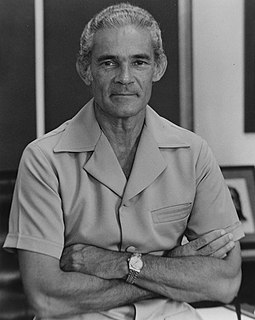
Michael Norman Manley ON OCC was a Jamaican politician who served as the fourth Prime Minister of Jamaica from 1972 to 1980 and from 1989 to 1992. Manley championed a democratic socialist program, and has been described as a populist. According to opinion polls, he remains one of Jamaica's most popular prime ministers.

The People's National Party (PNP) is a social-democratic political party in Jamaica, founded in 1938 by activist Osmond Theodore Fairclough. It holds 14 of the 63 seats in the House of Representatives, as 96 of the 227 local government divisions. The party is democratic socialist by constitution.

Sir William Alexander Clarke Bustamante was a Jamaican politician and labour leader, who, in 1962 became the first prime minister of Jamaica. He founded the Bustamante Industrial Trade Union following the 1938 labour riots, and the Jamaican Labour Party in 1943. Bustamante is honoured in Jamaica with the title National Hero of Jamaica in recognition of his achievements.
The Jamaica Labour Party (JLP) is one of the two major political parties in Jamaica, the other being the People's National Party (PNP). While its name might suggest that it is a social democratic party, the JLP is actually a conservative party. However, it has longstanding ties to the Jamaican labour movement.

Portia Lucretia Simpson-Miller is a Jamaican politician. She served as Prime Minister of Jamaica from March 2006 to September 2007 and again from 5 January 2012 to 3 March 2016. She was the leader of the People's National Party from 2005 to 2017 and the Leader of the Opposition twice, from 2007 to 2012 and from 2016 to 2017.
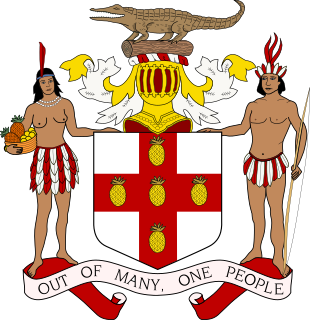
General elections were held in Jamaica on 30 October 1980. The balance of power in the 60-seat Jamaican House of Representatives was dramatically-shifted. Prior to the vote, the People's National Party (PNP), led by Prime Minister Michael Manley, had a 47 to 13 majority over the Jamaica Labour Party (JLP), led by Edward Seaga. With the loss by 38 PNP incumbents to their JLP challengers, Seaga's party captured a 51 to 9 majority and Seaga replaced Manley as Prime Minister of Jamaica. Voter turnout was 86.9%.
Allan George Richard Byfield was a Jamaican school teacher and politician. He was a senator of the West Indies Federation from 1958 to 1962, and president of the Senate of Jamaica from 1972 to 1980. In the late 1970s he was minister of education.
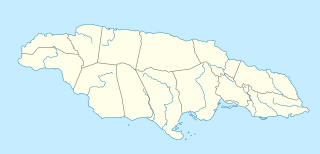
Tivoli Gardens is a neighbourhood in Kingston, Jamaica. Developed as a renewal project between 1963 and 1965, the neighbourhood continued to suffer from poverty. By the late twentieth century it had become a center of drug trafficking activity and social unrest. Repeated confrontations took place between law enforcement and gunmen in the neighborhood in 1997, 2001, 2005, 2008, and 2010.
Sharon Hay-Webster is a Jamaican politician. She was a member of the House of Representatives of the Parliament of Jamaica from 1997 to 2012, representing the People's National Party. She came to international attention after the 2004 Haitian coup d'état, when she escorted Jean-Bertrand Aristide from his temporary exile in the Central African Republic to Jamaica at the invitation of then-Prime Minister of Jamaica P. J. Patterson.

General elections were held in Jamaica on 29 December 2011. The elections were contested mainly between the nation's two major political parties, the governing Jamaica Labour Party (JLP), led by Andrew Holness, and the Portia Simpson-Miller-led opposition People's National Party (PNP). The result was a landslide victory for the PNP which won 42 of the 63 seats, a two-thirds majority.

General elections were held in Jamaica on 25 February 2016. The elections were largely a contest between the governing People's National Party (PNP) and the opposition Jamaica Labour Party (JLP). The result was a narrow victory for the JLP, which won 32 of the 63 seats. One political commentator described the poll as "the closest election Jamaica has ever had".
Ian Dave Hayles is a Jamaican politician with the People's National Party. He was a Member of the Parliament of Jamaica since 2007 before losing his seat to Jamaica Labour Party Candidate and Attorney-at-Law,Tamika Davis, at the September 3,2020 parliamentary elections.
Clifford Everald Errol Warmington is a Jamaican politician with the Jamaica Labour Party. He has represented the South West Saint Catherine constituency in the Parliament of Jamaica since 2002.
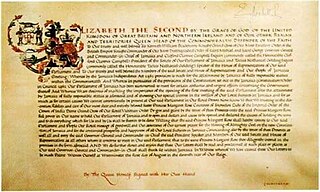
The Colony of Jamaica gained independence from the United Kingdom on 6 August 1962. In Jamaica, this date is celebrated as Independence Day, a national holiday.
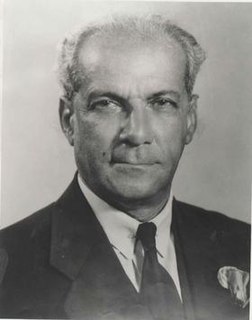
Norman Washington Manley MM, QC, National Hero of Jamaica, was a Jamaican statesman. A Rhodes Scholar, Manley became one of Jamaica's leading lawyers in the 1920s. Manley was an advocate of universal suffrage, which was granted by the British colonial government to the colony in 1944.
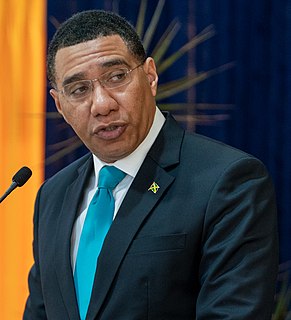
General elections were held in Jamaica on Thursday, 3 September 2020 to elect 63 members of Parliament. As the constitution stipulates a five-year parliamentary term, the next elections were not expected until between 25 February and 10 June 2021. However, Prime Minister Andrew Holness called early elections to ensure a united response to the ongoing COVID-19 pandemic. On the advice of Holness, Governor General Patrick Allen dissolved Parliament on 13 August 2020.

Republicanism in Jamaica is a position which advocates that Jamaica's system of government be changed from a constitutional monarchy to a republic. Both major political parties – the Jamaica Labour Party and the People's National Party – subscribe to the position, and the current Prime Minister of Jamaica, Andrew Holness, has announced that transitioning to a republic will be a priority of his government.
The attempted assassination of Bob Marley occurred in Jamaica on December 3, 1976, when seven armed men raided the house of reggae musician Bob Marley two days before he was to stage a concert in an attempt to quell recent violence. Politicians from across the political spectrum hoped to capitalize on Marley's support. While Marley remained neutral, many viewed him as tacitly supporting the prime minister Michael Manley and his democratic socialist People's National Party. Marley and three others were shot, but all survived. The gunmen were caught, tried, and executed.
The Jamaican political conflict is a long-standing feud between right-wing and left-wing elements in the country, often exploding into violence. The Jamaican Labor Party and the People's National Party have fought for control of the island for years and the rivalry has encouraged urban warfare in Kingston. Each side believes the other to be controlled by foreign elements, the JLP is said to be backed by the American Central Intelligence Agency and the PNP is said to have been backed by the Soviet Union and Fidel Castro.











